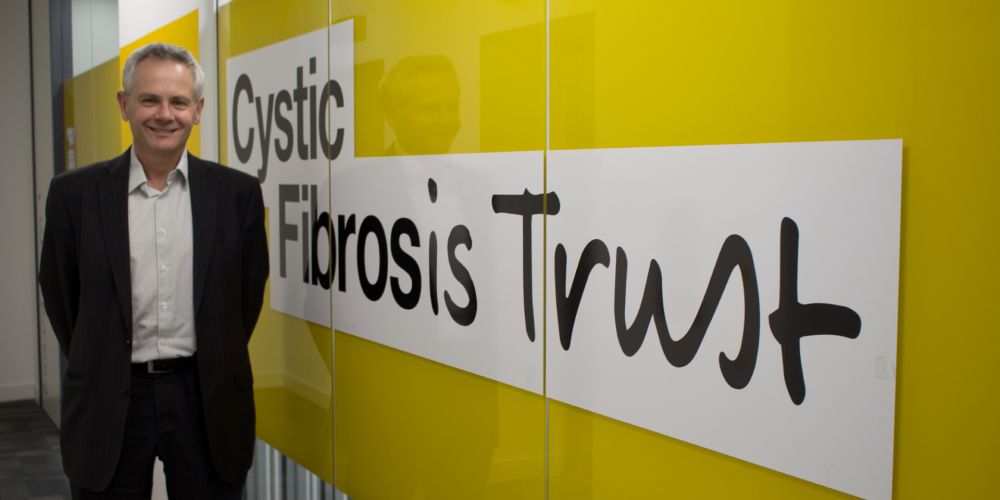
Director of Medical Affairs at the Cystic Fibrosis Trust Dr Keith Brownlee has played his part in transforming treatment of the condition – while raising two of Leeds’ most successful sporting alumni.
When Dr Keith Brownlee (Medicine 1984) first graduated from Leeds, the life expectancy for cystic fibrosis (CF) patients was in the teens. Nowadays, it is well over 40.
“We used to have wards of children with horrendous coughs producing pots full of thick green sputum every day,” Keith said. “I was inspired by the families and the children, and how they dealt with the condition. We would be in it together with one eye on the future, hoping for some breakthrough in treatment.”
That breakthrough came thanks to the likes of the CF Trust, Leeds researchers and the city’s hospitals, which have been involved in the development of a new class of drugs called modulators.
Listen to the full podcast episode on the Leeds Voices podcast.
Podcast transcript: Leeds Voices - Episode 11 Cystic Fibrosis Trust's Dr Keith Brownlee
CF is a genetic condition present from birth, with 1 in 25 people carrying the gene that causes it. One of these genes is needed from each parent to develop the condition.
“There are around 11,000 people in the UK with CF,” Keith said. “They are missing an ion channel on their cells which allows salt and water in and out.” The resulting sticky secretions cause problems in the lungs, which makes patients vulnerable to infection and lung scarring over years. They also suffer with problems with the pancreas, which cause issues when absorbing fats.
On graduating from Leeds, Keith moved into paediatrics. His rotation took him to the Beckett Wing at St James’s hospital in Leeds, where he became involved in CF care – at a time when most CF patients died as children. “I worked with Jim Littlewood, who travelled the world and brought the best CF care back to Leeds. I inherited his mantle and provided care for 200-250 kids in Leeds and the north of England.
“I was fascinated by the condition, and so impressed by how the families and children dealt with it. The chance to be involved really appealed to me – we were in it together to make life as good as possible for the child.”
Traditionally, medical teams sought to resolve the consequences of the mucus using treatments such as antibiotics. A collaborative effort between those with CF, charities, and pharmaceutical research helped to advance treatments, leading to the discovery of new modulator drugs, which interact with the ion channel. “Leeds has been a powerhouse of CF care over the years. They’ve led some world-leading research to make these breakthroughs.”
The modulators reconfigure the protein so that the channel works more effectively. “They have been truly transformational,” said Keith. “When I first started it was unusual for adults to have CF. Now 60 per cent of CF patients are over 18. It’s gone from being a child to adult condition in my lifetime.
“A drug called Kaftrio works on the commonest mutation of CF. It improves lung function, reduces the rate of decline, reduces flare ups of infection, reduces hospital admission and reduces the need for intravenous antibiotics. It’s a real success story.”
Leeds through and through
Ever since he enrolled at Leeds to study medicine, the city has been focal to Keith’s family life. He met his wife whilst studying at the University, and their first two children followed in their footsteps. They became two of the University’s most successful sporting alumni; Alistair (Sports Science and Physiology 2009, Hon LLD 2013) is the most successful triathlete in Olympic history with two gold medals, whilst Jonny (History 2012, Hon LLD 2013) is the most decorated, with three Olympic medals to his name.
“Over the years we travelled to see them a lot,” Keith said. “We’ve watched them in Beijing, Rio, Australia – it’s been a fascinating journey. It went from a hobby to a profession almost overnight.
“There have been challenges, too, because they’ve had heat exhaustion and we’ve seen them collapse. When you’re sitting at home watching on the TV and see that, it’s quite worrying.”
Although a keen runner himself, Keith remained dedicated to his medical career. He now works in an advisory role for the CF Trust, bridging the gap between the clinical community and the Trust.
“The Trust has funded some fantastic research as well as accelerator programmes which ensure people with CF get access to treatments as soon as possible.” They provide information for people with CF and advice around issues like schooling, work and accessing government support – as well as providing direct financial assistance. For clinical teams, they produce guidelines and standards of care for people with CF.
“But there is still work to be done,” Keith added. “There are a class of mutations for which the breakthrough drugs don’t work. Added to that, people with CF are going to live a lot longer, which presents new challenges to patients.
“People with CF get infected with bugs which can be passed to other individuals with CF, so they are advised to avoid coming into contact with each other. That makes the condition extremely isolating.
“CF is also considered an invisible disease. So a lot of people with it don’t tell their colleagues. They want to be treated as everybody else.”
Further information
For further details, email Ed Newbould, Digital Communications Officer, University of Leeds at e.w.newbould@leeds.ac.uk.